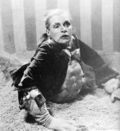Pages 532-536
This page-by-page annotation is organized by sections, as delineated by the seven squares (sprockets) which separate each section. The page numbers for this page-by-page annotation are for the original Viking edition (760 pages). Editions by other publishers vary in pagination — the newer Penguin editions are 776 pages; the Bantam edition is 886 pages.
Contributors: Please use a 760-page edition (either the original Viking edition with the orange cover or the Penguin USA edition with the blue cover and rocket diagram — there are plenty on Ebay for around $10) or search the Google edition for the correct page number. Readers: To calculate the Bantam edition use this formula: Bantam page # x 1.165. Before p.50 it's about a page earlier; as you get later in the book, add a page.
Finally, profound thanks to Prof. Don Larsson for providing the foundation for this page-by-page annotation.
Page 534
534.20 S.Z. ("Cuddles") SakallThe actor played the headwaiter, not (as Weisenburger states) a desk clerk, in Casablanca. Rick’s place in the film is a café, not a hotel.
534.11 FreaksIn the film’s unnerving conclusion, the freaks do not merely beat up Cleopatra, as described by Weisenburger, but chant "One of us!" as they transform her into a human chicken! The final image is one that is still omitted from some prints even after the film was re-released following decades of censorship.
Page 535
535.17 the element of Greed must be worked into the plot
Possibly a reference to Greed, the mutilated film masterpiece directed by Eric von Stroheim in 1924. An adaptation of Frank Norris’ McTeague, von Stroheim's film originally ran for 10 hours. At the insistence of MGM producer Irving Thalberg, von Stroheim cut it back to four hours but that too was finally cut by the studio again. The remaining footage was destroyed.
535.26 It is a message, in code
Related to how all of Pynchon's novels can be interpreted as (big) coded messages from the author.
- This "reading into" or seeing hidden messages in complex or confusing narratives strikes me, at least, as a major influence of drugs on this period of Pynchon's writing. The tripper tends to interpret whatever he sees around him as deeply important, bursting with meaning... coded or hidden messages... Bleakhaus 21:56, 12 June 2007 (PDT)
Page 536
536.16 a cork board... An introduction to Modern Herero, corporate histories
Probably the strongest clue in identifying Osbie Feel as some kind of representation of Pynchon himself. The author must have written Gravity's Rainbow with the aid of such books, notes and clutter.
Pynchon's editor for GR was Corlies "Cork" Smith.
| 1 Beyond the Zero |
3-7, 7-16, 17-19, 20-29, 29-37, 37-42, 42-47, 47-53, 53-60, 60-71, 71-72, 72-83, 83-92, 92-113, 114-120, 120-136, 136-144, 145-154, 154-167, 167-174, 174-177 |
|---|---|
| 2 Un Perm' au Casino Herman Goering |
181-189, 189-205, 205-226, 226-236, 236-244, 244-249, 249-269, 269-278 |
| 3 In the Zone |
279-295, 295-314, 314-329, 329-336, 336-359, 359-371, 371-383, 383-390, 390-392, 392-397, 397-433, 433-447, 448-456, 457-468, 468-472, 473-482, 482-488, 488-491, 492-505, 505-518, 518-525, 525-532, 532-536, 537-548, 549-557, 557-563, 563-566, 567-577, 577-580, 580-591, 591-610, 610-616 |
| 4 The Counterforce |
617-626, 626-640, 640-655, 656-663, 663-673, 674-700, 700-706, 706-717, 717-724, 724-733, 733-735, 735-760 |

